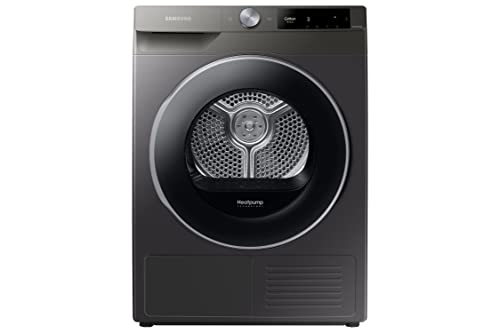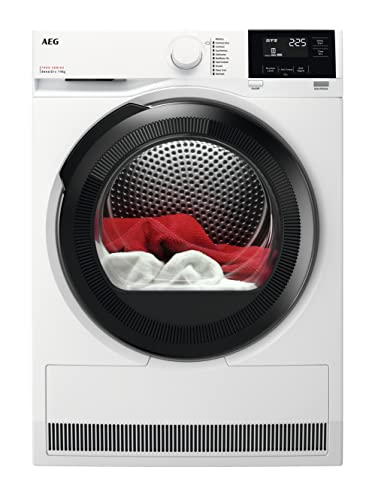The 10 Most Scariest Things About Dryers Heat Pump
페이지 정보

본문
 Why Buy a Dryer With a Heat Pump?
Why Buy a Dryer With a Heat Pump?The heat pump dryer functions exactly the same way as conventional gas or electric dryers. They warm air and then push it in to the drum. However, unlike them the warm air doesn't get pushed out into the vents -- where it could cause problems such as clogged and energy-consuming lint traps.
Since ventless heat pump dryers cool the air to remove moisture they can be positioned wherever. Learn more about the other benefits of these dryers.
Energy Efficiency
Heat pump dryers are a fraction of the energy that traditional vented dryers use. The reason is that they don't require their own heat as do conventional dryers. Instead they depend on an open loop refrigerant system that's similar to an air conditioner. The air that is pumped through the dryer's evaporator coil warms and absorbs moisture. This moisture then drips into a pan that can be emptied manually or connected to the drainage tube. Then the cool air flows through the coils, and starts the cycle.
The result is that heat pump dryers consume about two-thirds less electricity per load than conventional dryers, according to Energy Star. The dryers do not require venting. This eliminates the possibility of lint accumulating in the vent and reduces the chance of fire. Ventless dryers can be used in any area with an electrical outlet. This makes them ideal for small and compact spaces.
In addition, the energy efficiency of the heat pump dryer can translate into lower utility bills. This is particularly important considering the increasing cost of electricity. The dryers that use heat are generally more expensive upfront however they pay for themselves within two years because of their lower operating expenses.
Electric heat pump dryers consume less energy and are more efficient as condensing, non-heat pumps dryers. But their cycle times are a bit longer than conventional dryers.
If you're serious about reducing consumption of energy, then a heat pump dryer is the best way to go. It's the most efficient way to do laundry and is powered by electricity generated through solar or other renewable sources. If you're heading to a completely electric home and a heat pump clothes dryer is a must-have component of the home. This is because it's powered by the same renewable energy source that powers your other appliances, such as refrigerators and washers. As such, it can help you meet the target of having a completely electric home by 2050.
Convenience
Many dryers that have heat pumps come with moisture sensors to help avoid drying too long and help save energy. Some dryers heat pumps also come with anti-wrinkle technology as well as smart settings that can be controlled via smartphone. Some models that are ENERGY STAR certified models are able to reuse the water used to eliminate humidity from the air during the drying process and save you money on disposal costs.
Heat pump dryers are more flexible than vented and ducted clothes dryers since they do not require venting. This makes them suitable for a variety within the home, including attics and basements. The only downside is that they take longer to dry your laundry than regular electric models because they make use of less heat.
The heat pump dryers utilize the same air to dry clothes, instead of using hot air like conventional electric or gas dryers. A compressor presseurizes a coolant in one set of coils to release heat. Then, it moves through an expander valve before flowing into a different set of coils which cools and absorbs moisture. The process repeats over and dryers Heat Pump over until the load is completely dry. This is a much more energy efficient method than traditional dryers that use energy by heating air continuously to dry the laundry.
While heat pump dryers are green but they can be a little expensive in the beginning. But, they'll pay for themselves over time by reducing your energy bills. Many manufacturers offer rebates and incentives that can help offset the initial cost of a dryer that uses a heater.
Some dryers with heat pumps require a special drain hose to discard the water used to remove moisture from air and can increase the overall price of the device. While this isn't a huge drawback, it may be a deal breaker for some consumers.
The use of heat pump dryers has numerous benefits that are worth a look. They are gentler on fabrics, thus extending their lifespan while also looking good. They are also more cost-effective and can reduce your energy costs by up to 28% compared with conventional dryers.
Durability
These dryers cut down on energy costs and extend the life of clothes by reusing heat from air. They use the same process as vented dryers to wring water from clothes, but they don't release humid air outside your home. Instead, they recycle warm air that has already been cooled. They typically take longer to dry than conventional vented dryers because they operate at lower temperatures.
These dryers don't require vents and can be placed in any area that has electricity and water. These dryers are perfect for tiny homes, accessory living units (e.g. an apartment above the garage) and even additions. Some models are able to fit into small spaces, and some can be stackable. Larger ventless heat pumps, which can earn the Energy STAR label, offer greater capacity.
These machines spin clothes inside a heated drum, just like traditional vented dryers. As the clothes spin the hot drum heats up, and it wrings out the moisture. The water is then stored in a separate tank, drain hose or a draining hose that has to be manually or automatically drained. Some dryers have a tank that needs to be regularly drained or more frequently, while others have a self-draining system that requires less maintenance.
Because they're more complicated than vented dryers and vented dryers, heat pump dryers have higher repair costs and are more costly to service. These machines are still worth the investment if you are looking to save money and reduce your utility bills.
Your laundry habits and budget are the two most important aspects to take into consideration when deciding whether you should purchase a heat-pump dryer. If you're an avid laundry user and prefer shorter drying times, then traditional vented Dryers heat Pump are your best option. On the other side, if you're looking for savings over the long term and do not mind 2.5-hour drying times the heat pump dryer is a great option. They can save you as much as $2,600 per year in energy costs, and they last twice longer than traditional vented models.
Noise
Heat pump dryers tend to be quieter than traditional dryers, although noise levels can differ between brands and models. Understanding the way noise is measured and comparing noise ratings can help consumers select the model that best suits their needs and preferences. If noise is an issue, it may be best to plan to use your dryer in quiet times when sleep and household activities patterns are less disturbed. The dryer could also be positioned in a space that is less prone to vibration, and separated from the floor with mats made of rubber or anti-vibration pads.
Grinding and squeaking noises could be a sign of a dryer drum that is overloaded that is unable to rotate in a proper manner. To avoid this, make sure to follow the manufacturer's recommendations regarding load capacity and avoid overfilling the dryer. Balancing larger items, like comforters and blankets, by balancing them with a small number of smaller items can improve performance and reduce grinding and squeaking noises during drying.
Certain heat pump dryers make an erupting sound during the drying process, which is normal and a sign that the dryer is operating in the way it was intended to. If the sound becomes more loud or persists it could mean that your dryer's lint filters and vents are blocked and require cleaning.
Regularly cleaning the lint filter and dryer vents is essential to ensure that a heat pump dryer that performs properly. This will reduce the noise during the drying cycle, and prolong the life of the appliance.
Some dryers that use heat pump are heat pump tumble dryers any good advertised as being able to run on regular 120-volt 15-amp electrical circuits which is a great option for those who reside in older homes and have a limited number of power outlets. However, this could be a false advertising claim because the majority of electric dryers require 220-volt, 30-amp circuits to function correctly. A heat pump dryer running on a standard circuit will increase the risk of fire and electric shock. Therefore, it is always recommended to hire a professional electrician when installing the heat pump dryer within an existing home.

- 이전글аду бай организация воспитания 24.05.23
- 다음글You'll Never Be Able To Figure Out This Online Shopping Uk Amazon's Tricks 24.05.23
댓글목록
등록된 댓글이 없습니다.